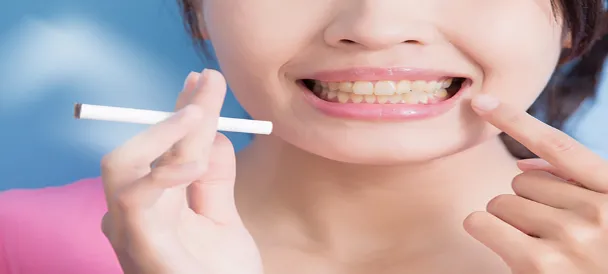Gum (periodontal) disease is an infection of the gums and can influence the bone structure that upholds your teeth. In extreme cases, it can make your teeth drop out. Smoking is a significant reason for serious gum sickness
Gum disease begins with bacteria (germs) on your teeth that get under your gums. If germs continue on your teeth for too long, layers of plaque (film) and tartar (hard plaque) form.
dentist baner
Smoking causes dental problems, including:
-Terrible breath
-Tooth stains
-Irritation of the opening of the salivary glands in the upper part of the mouth
-Extended development of plaque and tartar on teeth
-Extensive bone loss within the jaw
-An increased hazard of leukoplakia, white patches inside the mouth
-Increased risk of developing gum disease, a major source of dental misfortune
-Deferred recovery measures after tooth extraction, periodontal treatment, or oral medical procedures
-The low success rate of dental embedding methods
-Increased risk of developing oral disease
dentist baner
dentist baner
How does smoking cause gum disease?
Smoking and other tobacco products can affect the bone and delicate tissue attachment of your teeth, causing gum disease. Even more clearly, smoking interferes with the normal ability of gum tissue cells. This blockage makes smokers more vulnerable to contamination, for example, periodontal disease, and appears to weaken blood flow to the gums which can affect wound healing.
Does pipe and cigar smoking cause dental problems?
Indeed, cigarettes, fennel, and stogies cause oral medical problems. Channel smokers have the same risk of tooth decay as cigarette smokers. After these dangers, Chanel and Stogie smokers are at risk of oral and pharyngeal (pharynx) tumors – regardless of whether they inhale – and other oral consequences – terrible breath, restained teeth, and an extended risk of periodontal (gums)illness
Are smokeless tobacco products safe?
No. Likestogies and cigarettes, smokeless tobacco products (for example, snuff and chewing tobacco) in any case contain 28 artificial substances that pose a risk of oral malignancy and throat and throat disease. Indeed, chewing tobacco contains higher levels of nicotine than cigarettes, making it more difficult to quit than cigarettes. Furthermore, one jar of snuff provides more nicotine than 60 cigarettes.
dentist baner
Smokeless tobacco can worsen your gum disease, causing it to recede or pull away from your teeth. When gum tissue recedes, the roots of your teeth are exposed, increasing the risk of tooth decay. Exposed roots are also more sensitive to hot and cold or different stimuli, making eating and drinking difficult. Moreover, sugars, which are frequently added to improve the kind of smokeless tobacco, can expand your danger of tooth decay.
Kick the tobacco habit
Regardless of how long you have used tobacco products, stopping now can reduce the real risks to your health. After eleven years of cessation, former smokers’ risk of periodontal (gum) disease was not unique to that of never smokers.
In any case, reducing the amount you smoke seems to help. One study found that smokers who reduced their smoking habits to less than a pack a day had a disproportionately low risk of developing gum disease, and only a few times the risk of non-smokers. . Smoked more than a pack and a half for each day.
dentist baner
How can I quit tobacco?
To quit tobacco use, your dentist or specialist may have the option of helping you quell nicotine cravings with medications, for example, nicotine gum and the fix. A portion of these items can be purchased over the counter; Others require solutions. Different drugs (for example, Zyban) require a solution.
Contact your primary care physician or dental specialist for data on comparable projects they may be comfortable with.
Skin Specialist in Baner , Dentist in Baner, Root canal Specialist in Baner, Best dental clinic in baner, Best dentist in baner

